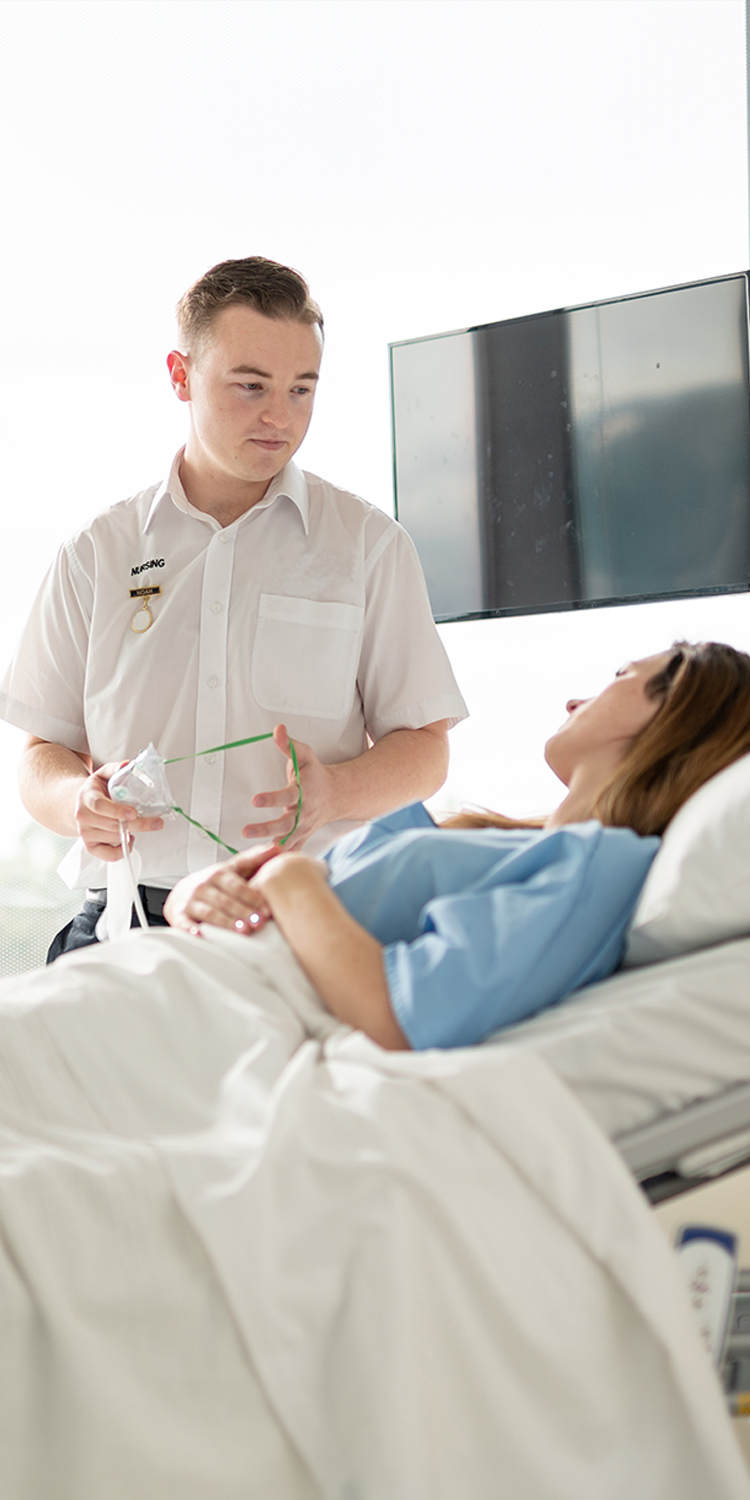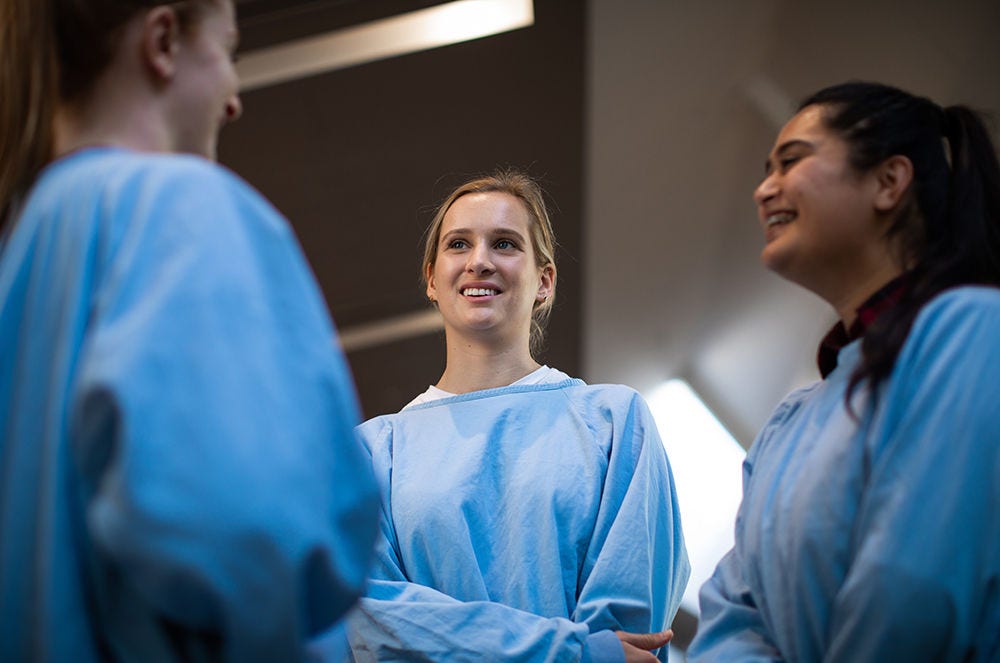Adelaide University’s medical program aims to provide its graduates with the basic knowledge, skills and competencies required for the practice of medicine as a junior hospital doctor.
These attributes form the foundation for future career options and ongoing self-directed learning. A broad-based, experiential and patient-oriented curriculum is necessary for the development of such knowledge and skills. In this sense the program is different from many other programs offered by the University.
The approaches to individual learning, academic values and teaching methods used are designed and used with this aim in mind. In particular, the importance of functioning as part of a team, the ability to communicate effectively, habits of ongoing, self-directed learning and the adoption of a high standards of professional and ethical conduct are repeatedly emphasised.
The Adelaide University’s medical program is a strongly experiential course: simply acquiring knowledge is not sufficient. Rather, students actively participate in practical learning experiences which will prepare them for their future careers as doctors, should they wish to practice. Because the award does entitle graduates to obtain medical registration, the University must ensure that those upon which it confers this award can present themselves as having the appropriate knowledge, experience and expertise.
Timeliness is a key factor in relation to many elements of the medical program. The ability of a medical practitioner to carefully observe, communicate, formulate judgements and then act in a timely manner may be crucial in the performance of their duties. An appreciation of the importance of timeliness and the ability to perform in a timely manner is therefore emphasised repeatedly during the medical program. Assessments during clinical placements and in the form of examinations (e.g. oral and/or practical examinations) usually include some assessment of timeliness.
The medical program places substantial demands on its students. The learning style and assessment techniques are likely to be different from those experienced elsewhere. Clinical placements can require significant time commitments of students, which may include time periods normally regarded as 'after hours'. Students will need physical and mental stamina, as well as flexibility with respect to hours of attendance. Placements are undertaken at a range of locations around South Australia, some of which will be in rural and/or remote areas.
Inherent requirements statement
Inherent requirements are the fundamental parts of a degree that must be met by all students. They are the abilities, knowledge and skills you need to complete the degree. Students with a disability or chronic health condition may have adjustments made to enable them to meet these requirements. There may also be other considerations, such as cultural or religious considerations, that may impact on your capacity to meet an inherent requirement, and so may require adjustments. However, any adjustments must not fundamentally change the nature of the inherent requirement.
All students must fulfil the inherent requirements of the Bachelor of Medical Studies and Doctor of Medicine degree they are undertaking. While reasonable adjustments can be made, these adjustments cannot compromise academic integrity. It is the student's responsibility to check all the requirements of courses, and consider the effects of any medical condition or disability on their ability to complete the degree requirements. If you have any questions, contact our Future Student Enquiry Team.
There are five categories of inherent requirements in the Bachelor of Medical Studies and Doctor of Medicine programs, which are as follows:
Observation
Observational skills (vision, hearing, smell and touch) are required as part of this program. Skills required include:
At a distance
- observing the broader environment e.g. observing multiple patients, monitors and different components of the experience
- precise and rapid reaction to sensory stimuli e.g. identifying hazards and safety issues and reacting within a limited timeframe.
Close at hand
- gathering and interpreting data e.g. patient notes, X-rays, hand-written and computer documents, printed material, test results and medication charts, clinical and pathological specimens
- recognising and interpreting sensory stimuli relating to vision, hearing and touch.
Communication
Communication skills are required as part of this program. Skills required include the capacity/ability to:
Speech
- speak to elicit information
- instruct and describe as necessary
- be understood by others
Hearing
- hear in order to gather and organise information provided
- differentiate sounds, background noise, alarms and speech
- participate in group discussions.
Observation
- perceive non-verbal communication
- Interpret distress, a change in mood, activity or posture.
Writing
- document ideas and information
- construct legible handwriting.
Reading
- read information in a variety of formats, including handwritten, printed text, on-line information, graphs and diagrams.
Motor
Fine motor skills are required as part of this program. Skills required include the capacity/ability to:
- manipulate instruments
- use hand eye coordination to complete tasks as necessary
- gather and interpret information through touch
- perform and/or assist at diagnostic and therapeutic procedures.
Gross motor skills and mobility required include the capacity/ability to:
- maintain a standing position while using both upper limbs for another task
- undertake physical or manual tasks e.g. moving or positioning equipment, percussion or palpation
- manoeuvre around equipment and in confined spaces and over defined distances
- assist with patient transfers
- provide general and emergency patient care including basic life support (requires use of both arms and may require assumption of a kneeling position).
Intellectual-conceptual, integrative and qualitative abilities
Intellectual-conceptual, integrative and numerical abilities are required as part of this program (e.g. recalling information without reference, drug calculations).
Timeliness
This means:
- completing a task in a safe/appropriate time frame is a factor in relation to intellectual-conceptual, integrative and numerical skills required as part of this program.
- problem solving, reasoning and synthesis of information occur within a clinical context in which decisions and actions are required within defined timeframes.
Types of reasoning that are required include the capacity/ability to:
- scientific reasoning
- sound decision-making
- consistent judgments
- clinical reasoning and rational thought
- ethical reasoning.
Types of problem-solving that are required include the capacity/ability to:
- break problems down into their component parts
- prioritise tasks and workload appropriately
- undertake and interpret measurements and calculations.
Ability to synthesise information that is required include the capacity/ability to:
- apply learned information in decision-making
- utilise conceptual frameworks to guide practice
- identify and apply important and relevant information
- assess and diagnose (assess and interpret information to define a problem and develop a plan to resolve appropriately).
Behavioural and social
Behavioural skills that are required as part of this program include the capacity/ability to:
- function effectively in stressful situations
- deal with uncertainties
- demonstrate consistent cognitive function
- demonstrate sufficient self-awareness to manage fluctuations in health and emotional status
- adapt to change
- maintain logical and realistic thinking patterns.
Social skills that are required as part of this program include the capacity/ability to:
- perceive, recognise and respond appropriately to emotion
- perceive and respect relationship barriers
- demonstrate personal insight in regards to safe and professional practice
- interact with patients and colleagues from a variety of cultural backgrounds
- communicate sensitively with others, and with cultural awareness.
Reasonable adjustments for students with disabilities
Adelaide University supports the inclusion of students with disabilities by providing reasonable adjustments. In determining whether an adjustment is reasonable, the University will take into account:
- the nature of the disability
- the effect of the adjustment on the student’s ability to achieve and demonstrate the required learning outcomes and participate in the program
- the effect of the proposed adjustment on anyone else, including staff and other students
- the reasonability of costs and logistical impact.
Reasonable adjustments may include modification to assessment and provision of additional support services; however, adjustments cannot be provided which would undermine the core or inherent learning required and thus compromise the academic integrity of the program.
Once enrolled in a course at Adelaide University, students with disabilities have access to the University’s counselling and disability services, whose role is to collaborate with other University staff to provide adjustments required for courses and examination, and to provide information and advice to assist students to achieve their learning outcomes.









